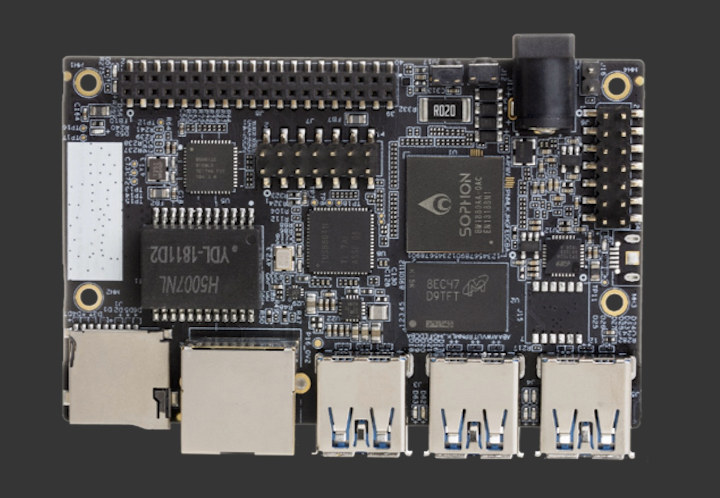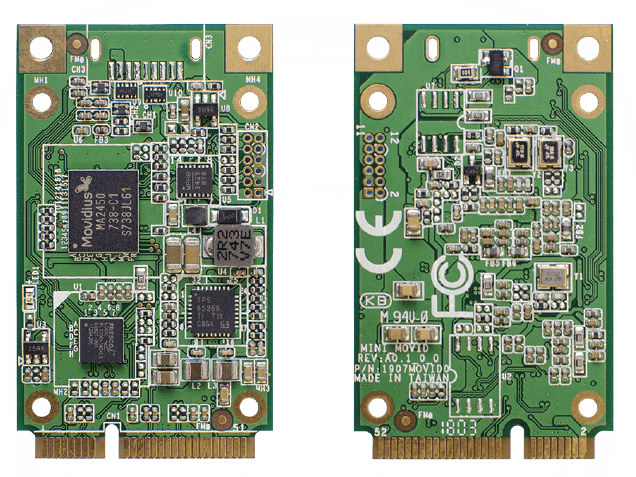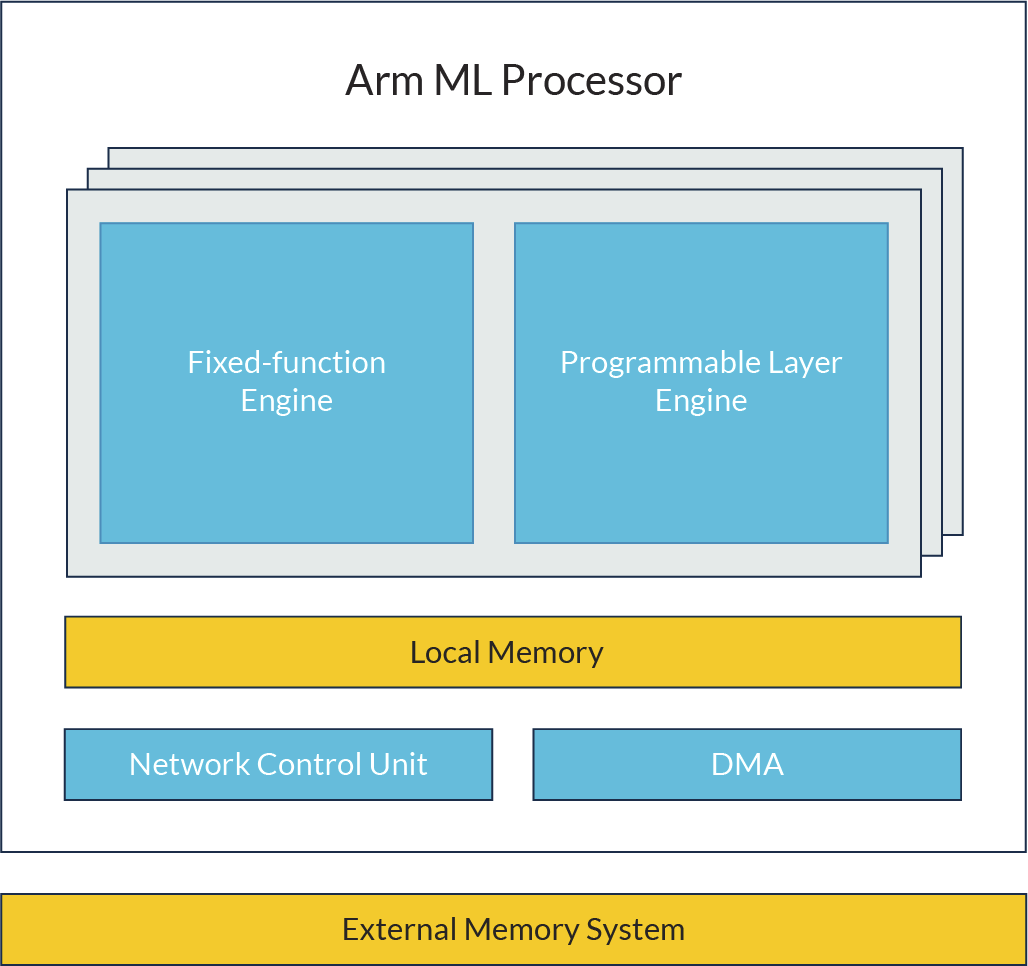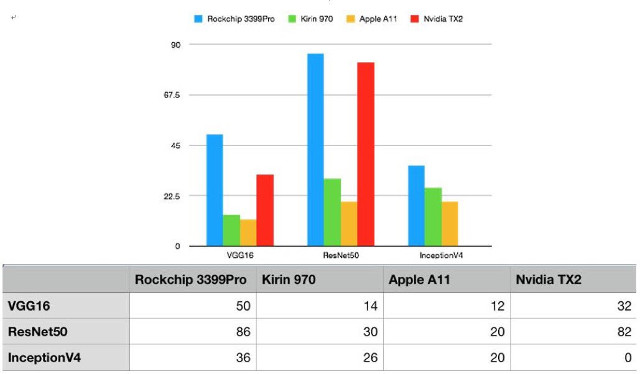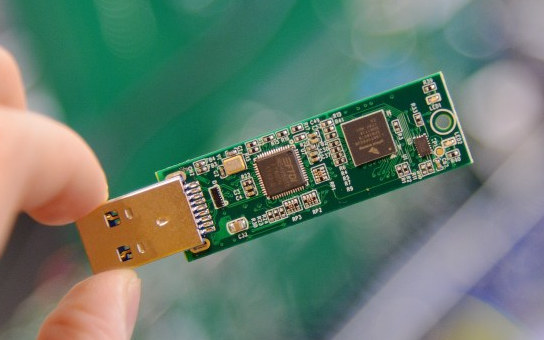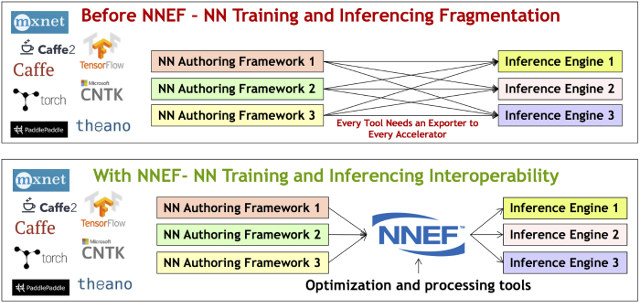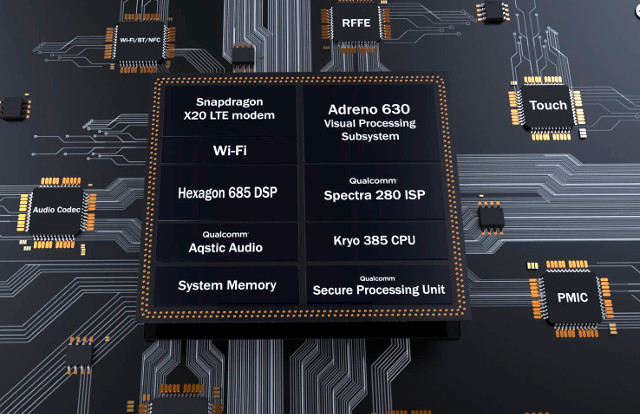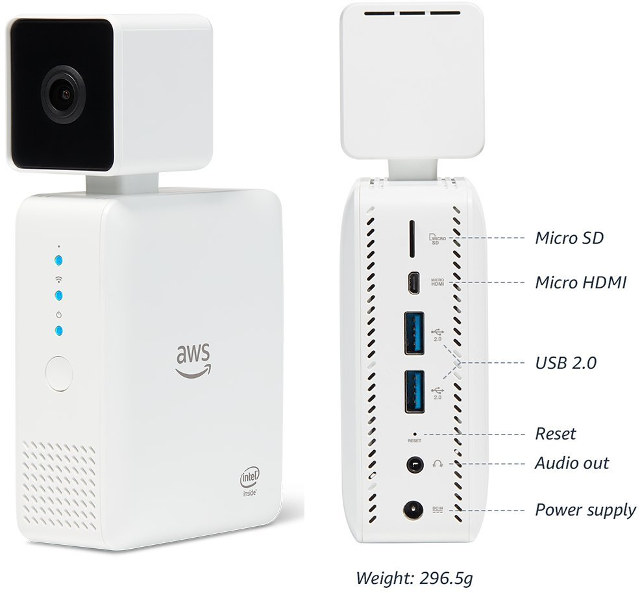Bitmain, a company specializing in cryptocurrency, blockchain, and artificial intelligence (AI) application, has just joined Linaro, and announced the first 96Boards AI platform featuring an ASIC: Sophon BM1880 Edge Development Board, often just referred to as “Sophon Edge”. The board conforms to the 96Boards CE specification, and include two Arm Cortex-A53 cores, a Bitmain Sophon Edge TPU delivering 1 TOPS performance on 8-bit integer operations, USB 3.0 and gigabit Ethernet. Sophon Edge specifications: SoC ASIC – Sophon BM1880 dual core Cortex-A53 processor @ 1.5 GHz, single core RISC-V processor @ 1 GHz, 2MB on-chip RAM, and a TPU (Tensor Processing Unit) that can provide 1TOPS for INT8,and up to 2 TOPs by enabling Winograd convolution acceleration System Memory – 1GB LPDDR4 @ 3200Mhz Storage – 8GB eMMC flash + micro SD card slot Video Processing – H.264 decoder, MJPEG encoder/decoder, 1x 1080p @ 60fps or 2x 1080p @ 30fps H.264 decoder, […]
$70 UP AI Core mini PCIe Card Features Intel Movidius Myriad 2, Supports Tensorflow and Caffe Frameworks
AAEON’s Up Board has given us some affordable Intel development boards over the years with products such as the Cherry Trail based UP Board, or Apollo Lake powered UP Squared board among others, that are competitively priced against equivalent Arm development boards. The company has now launched a new UP AI Edge family, which will include hardware based on Intel Altera FPGA or Intel Movidius VPU (Vision Processing Unit). Their first product is based on the latter, more exactly Movidius 2 2450 VPU, and instead of being a standalone board, UP AI Core is a mini PCIe card that can fit into any 64-bit Intel board or computer. UP AI Core card specifications: SoC – Intel Movidius Myriad 2 2450 VPU System Memory – 512MB DDR SDRAM Mini PCIe edge connector Dimensions – 51 x 30 mm Host computer/board requirements System Memory – 1GB RAM or more Storage – 4GB […]
Arm’s Project Trillium Combines Machine Learning and Object Detection Processors with Neural Network Software
We’ve already seen Neural Processing Units (NPU) added to Arm processors such as Huawei Kirin 970 or Rockchip RK3399Pro in order to handle the tasks required by machine learning & artificial intelligence in a faster or more power efficient way. Arm has now announced their Project Trillium offering two A.I. processors, with one ML (Machine Learning) processor and one OD (Object Detection) processor, as well as open source Arm NN (Neural Network) software to leverage the ML processor, as well as Arm CPUs and GPUs. Arm ML processor key features and performance: Fixed function engine for the best performance & efficiency for current solutions Programmable layer engine for futureproofing the design Tuned for advance geometry implementations. On-board memory to reduce external memory traffic. Performance / Efficiency – 4.6 TOP/s with an efficiency of 3 TOPs/W for mobile devices and smart IP cameras Scalable design usable for lower requirements IoT (20 […]
Rockchip RK3399Pro SoC Integrates a 2.4 TOPS Neural Network Processing Unit for Artificial Intelligence Applications
Rockchip RK3399 (aka OP1) SoC was launched in 2016 with an hexa core Arm Cortex A72/A53 processor, Mali-T860MP4 GPU, support for 4K video decoding, and high speed interfaces like USB 3.0 and PCIe, as well as Gigabit Ethernet. The processor is found in Chromebooks, TV boxes, development boards, and other devices. The company has unveiled an upgraded “Pro” version of the processor at CES 2018. Rockchip RK3399Pro appears to have most of the same features as its predecessor but adds a neural network processing unit (NPU) delivering up to 2.4 TOPS for artificial intelligence and deep learning applications. The company claims that compared to traditional solution, the computing performance of typical deep neural network Inception V3, ResNet34 and VGG16 models on RK3399Pro is improved by almost one hundred times, and power consumption is less than 1% than A.I. solutions implemented using GPU acceleration. Based on the information provided in the […]
Laceli AI Compute Stick is a More Powerful & Efficient Alternative to Intel/Movidius Neural Compute Stick
Intel’s Movidius Neural Compute Stick is a low power deep learning inference kit and “self-contained” artificial intelligence (A.I.) accelerator that connects to the USB port of computers or development boards like Raspberry Pi 3, delivering three times more performance than a solution accelerated with VideoCore IV GPU. So far it was the only A.I USB stick solution that I heard of, but Gyrfalcon Technology , a US startup funded at the beginning of last year, has developed its own “artificial intelligence processor” with Lightspeeur 2801S, as well as a neural USB compute stick featuring the solution: Laceli AI Compute Stick. The company claims Laceli AI Compute Stick runs at 2.8 TOPS (Trillion operation per second) performance within 0.3 Watt of power, which is 90 times more efficient than the Movidius USB Stick that can deliver 100 GFLOPS (0.1 TOPS) within 1 Watt of power. Information about the processor and stick […]
Khronos Group Releases Neural Network Exchange Format (NNEF) 1.0 Specification
The Khronos Group, the organization behind widely used standards for graphics, parallel computing, or vision processing such as OpenGL, Vulkan, or OpenCL, has recently published NNEF 1.0 (Neural Network Exchange Format) provisional specification for universal exchange of trained neural networks between training frameworks and inference engines. NNEF aims to reduce machine learning deployment fragmentation by enabling data scientists and engineers to easily transfer trained networks from their chosen training framework into various inference engines via a single standardized exchange format. NNEF encapsulates a complete description of the structure, operations and parameters of a trained neural network, independent of the training tools used to produce it and the inference engine used to execute it. The new format has already been tested with tools such as TensorFlow, Caffe2, Theano, Chainer, MXNet, and PyTorch. Khronos has also released open source tools to manipulate NNEF files, including a NNEF syntax parser/validator, and example exporters, which can […]
Qualcomm Snapdragon 845 Octa Core Kryo 385 SoC to Power Premium Smartphones, XR Headsets, Windows Laptops
Qualcomm Snapdragon 845 processor was expected since May 2017 with four custom Cortex A75 cores, four Cortex A53 cores, Adreno 630 GPU, and X20 LTE modem. with the launch planned for Q1 2018. At least, that what the leaks said. Qualcomm has now formally launched Snapdragon 845 Mobile Platform and rumors were mostly right, as the the octa-core processor comes with four Kryo 385 Gold cores (custom Cortex A75), four Kryo 385 Silver cores (custom Cortex A55) leveraging DynamIQ technology, an Adreno 630 “Visual Processing System”, and Snapdragon X20 modem supporting LTE Cat18/13. The processor is said to use more advanced artificial intelligence (AI) allowing what the company calls “extended reality (XR)” applications, and will soon be found in flagship smartphones, XR headsets, mobile PCs, and more. Qualcomm Snapdragon 845 (SDM845) specifications: Processor 4x Kryo 385 Gold performance cores @ up to 2.80 GHz (custom ARM Cortex A75 cores) 4x […]
AWS DeepLens is a $249 Deep Learning Video Camera for Developers
Amazon Web Services (AWS) has launched Deeplens, the “world’s first deep learning enabled video camera for developers”. Powered by an Intel Atom X5 processor with 8GB, and featuring a 4MP (1080p) camera, the fully programmable system runs Ubuntu 16.04, and is designed expand deep learning skills of developers, with Amazon providing tutorials, code, and pre-trained models. AWS Deeplens specifications: SoC – Intel Atom X5 Processor with Intel Gen9 HD graphics (106 GFLOPS of compute power) System Memory – 8GB RAM Storage – 16GB eMMC flash, micro SD slot Camera – 4MP (1080p) camera using MJPEG, H.264 encoding Video Output – micro HDMI port Audio – 3.5mm audio jack, and HDMI audio Connectivity – Dual band WiFi USB – 2x USB 2.0 ports Misc – Power button; camera, WiFi and power status LEDs; reset pinhole Power Supply – TBD Dimensions – 168 x 94 x 47 mm Weight – 296.5 grams The […]


